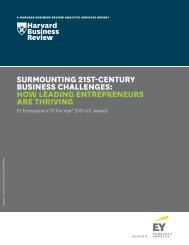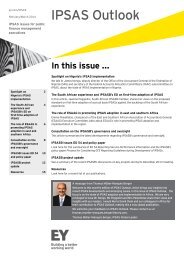Africa 2030: Points of viewAfrica is closer than we think...William PollenWilliam Pollen is Program Director of Invest in Africa, a partnership working together to address thecross-sector challenges of doing business in Africa.That coffee you had this morning, did you happen to notice wherethe beans were from?Italy, Brazil or perhaps Indonesia, but what about Uganda or Coted’Ivoire?The shirt on your back and that new Benetton jumper you likewearing so much, where was the cotton they’re made from picked;China, India, America or possibly Zambia?And those fine leather shoes you wear to important meetings, haveyou ever noticed that on the sole there’s a tiny inscription thatreads ‘made in Ethiopia’?But what’s more impressive is that you didn’t use any cash or a cardto pay for any of them. No. Instead you used your mobile phonewith its new Kenyan powered technology.Africa and the resources it has to offer are closer than we think.My ‘vision’ for Africa in 2030 is that the continent can move froma net importer, to a net exporter, so that we live in a world whereAfrica’s goods and services are no longer just occasionally part ofour lives but are around every corner, on every high street, so thatyou couldn’t imagine life without them.To achieve this the private and public sectors must work togetherto turn Africa’s much touted potential to be a global manufacturingpower house, the world’s bread basket and a provider of highquality services and ITC, into reality by 2030.Local content for global growthVisions and potential is one thing, what matters more is the abilityto deliver on them.In this regard, I firmly believe that the issues we currently framein language of ‘Local Content’ are critical to achieving this vision.Progress on local content holds the key to ensuring Africancompanies consistently deliver to international standards, enablingthem to compete on a level playing field, and then in time goingonto become global exporters in their own right, just as today,China is in manufacturing, Turkey is in clothing and India is in ITCservices.No matter how you define local content, a commitment from largerinternational and domestic companies to build on the capacityand capabilities of local people and businesses is fundamental toAfrica progressing from a net importer to a net exporter. Howeverthe private sector cannot do this alone. Governments must be thedriving force by creating a transparent framework, in consultationwith the private sector, which creates accountability and a levelplaying field for all.Without this legitimate framework even the best intended localcontent legislation is open to abuse and will be misinterpreted byinvestors as an additional cost of doing business. Instead, it shouldbe seen as a huge opportunity to localise your entire businessmodel, better understand local cultures, practices and consumers,whilst also reducing your operating costs and political risk.62
There has been some progress in recent years as Africangovernments have opened up to FDI and investors have started toovercome the traditional misconceptions and prejudices that untilrecently kept Africa ‘off limits’. Even Africa’s commodities, for solong the bedrock of the continent’s trade relations with the rest ofthe world, no longer have to take a round the world trip, with all thevalue addition taking place offshore, before returning to its sourceat an inflated price. Witness the return of De Beers operationsfrom London to Gaborone, Botswana and the numerous large-scalerefineries planned in Tanzania, Mozambique, Uganda and Nigeria toname but a few.But, how do we ensure this progress continues and takes placeacross all sectors of the economy, not just in commodities, so thatAfrica’s growth will be home-grown by 2030?Here too, local content regulations and practices have a huge roleto play.Lessons can be learned by looking at successes elsewhere. WhenNorway first discovered oil in the 1960’s it had no previousknowledge or expertise in oil and gas, at the time the local economywas built largely on income from shipping and fishing. So, thegovernment made education the pillar of their efforts by takingthe time to build long-term capabilities and knowledge of the oilindustry ‘in-country’. Training programmes were established inproduction and transporting techniques and the sudden need forengineers was met through five-year training programmes. Africancountries such as Ghana, which first discovered significant oil fieldsin 2007, may not yet have the infrastructure in place, but can learnfrom Norway’s long-term mindset and commitment to education.Local content successes are not just limited to developedeconomies. After the 2008 global financial crisis, Brazil facedmany of the same challenges that are now being faced by Africancountries today. These include a trade deficit, limited industrial andtechnological competitiveness, high interest rates and an overdependenceon commodity exports.However, Brazil’s domestic aviation industry has benefited frompolicies that manage levels of foreign ownership, not investment,and an ‘open skies’ relationship with key markets. Similarly, India’s‘Vision 2020’ policy aims to give the people greater access toeducation, healthcare and finance by focusing on infrastructuredevelopment in ITC architecture.Progress is already being made in Africa, countries like Kenya andBotswana whose ‘Vision 2030’ and ‘Vision 2016’ policies set outclear objectives and a blue-print for how these objectives will beachieved, with local content at their heart.However, more needs to be done by both sides.From governments there needs to be a more genuine consultationwith the private sector, with feedback reflected in final legislation.Expectations need to be better communicated and managed,especially with the media, to prevent the perception that ‘lifechanging’ growth will occur overnight and benefit every citizenequally. In turn, this will reduce the huge short-term pressures thismindset creates, helping give governments the time needed tosuccessfully implement local content policies.From the private sector we need to see greater efforts tounderstand the genuine intent behind most local contentlegislation. With greater understanding comes a recognition thatthe requirements set out in legislation are frequently an ultimatelonger-term objective- not a dictate and so should not be seen asan additional cost of doing business. A more collaborative approachin working with governments on local content policy offers theprivate sector unique opportunities to shape the very legislationthey operate within, and improve both sides’ understanding of eachothers’ businesses.This more collaborative style to local content not only makes goodbusiness sense, it will also create the quality domestic companiesthat foreign investors are in such need of as local partners andsuppliers. In time these domestic success stories will go on tocompete on a global scale, delivering African products and servicesto your high street and your doorstep every day.Africa 2030: Realizing the possibilities63





